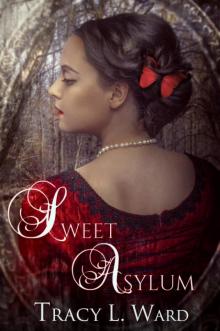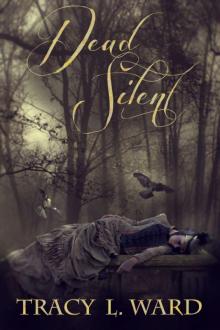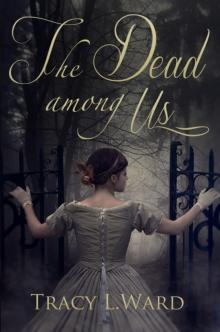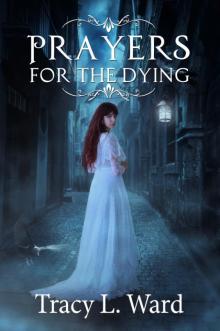- Home
- Tracy L. Ward
Sweet Asylum
Sweet Asylum Read online
Sweet Asylum
By Tracy L. Ward
Willow Hill House
Ontario, Canada
Ebook Edition
ISBN-978-0-9881334-6-4
Copyright © 2015 by Tracy L. Ward
Cover Art Copyright 2015 © by Claudia McKinney
@ phatpuppyart.com
Cover Photo by Shutterstock.com
Edited by Lourdes Venard
@ Comma Sense Editing
Chapter Headings are linear excerpts from the poem “Approaching Night”
by John Clare (1793-1864)
Full text poem appears following epilogue
All rights reserved. Except for use in any review, the reproduction or utilization of this work in whole or part in any form by any electronic, mechanical or other means, now known or hereafter invented, including xerography, photocopying, and recording, or in any information storage or retrieval system, is forbidden without written permission of the publisher,
Tracy L. Ward [email protected]
This is a work of fiction. Any names, characters, places and incidents are either the product of the author’s imagination or used as a work of fiction. Any resemblance to actual persons, living or dead, business establishments, events or locales is entirely coincidental.
Dedicated to Jennifer,
my sister, my best friend
Chapter 1
O take this world away from me;
Its strife I cannot bear to see,
Kent County, 1868— Forceps in hand, Dr. Ainsley squinted at the body in front of him, ensuring it was dead before proceeding with his work. The surgeon positioned his magnifying glass in such a way that would allow him to see the finer details of the specimen. The head was the most delicate part, as he understood it, and he must proceed with caution if he were to keep the butterfly intact and undamaged.
“Papillon…papillon.” He repeated the words as he worked to spread the butterfly’s wings on the board. He varied his enunciation while trying to recall the manner in which their French tutor from years prior preferred it to be said. So much knowledge, previously held in similar regard to other subjects, had been lost after years of intense medical studies. It was an unfortunate circumstance that Ainsley was determined to rectify. Revisiting his interest in insects seemed a natural place to start.
Beside him he had a small cache of pins and a pile of thin paper with which to work. He had to be careful to ensure symmetry. Already that day he had dislodged an antennae and an assortment of legs from other insects he had hoped to include in his permanent collection, but the mounting frustration he felt remained harnessed inside. He wasn’t about to allow anything to disrupt the peace he so desperately craved.
Entomology was proving to be far less taxing on him than surgery ever was. Here in his claimed laboratory, which used to serve as the library at his family’s country home, Dr. Peter Ainsley could live as Peter Marshall, second heir to a wealthy peer of England and nothing more. Unlike St. Thomas Hospital, there was no rush to move on to the next questionable death, no pressure to find a culprit, natural or otherwise. Here, in the sanctity of his childhood home, Ainsley could forget that the seedy and base city of London even existed. Instead, he could hide away with his moths, beetles, and butterflies, pushing down deeds of his past, both vile and incomprehensible, which threatened daily to overwhelm him.
He heard someone enter the room but he dared not look up. His work required him to move quickly before the butterfly hardened. He needed to position at least twenty-five pins around the wings to keep them from shifting, and he was not about to turn away. He suspected it was his sister, Margaret, whom he hadn’t spoken more than a handful of words with since they arrived. He kept mainly to his room and the library, while Margaret walked the grounds restlessly revisiting old haunts and no doubt mourning a childhood that was unmistakably dead.
All that they had gone through—the murder of their mother, the continued absence of their father, and a steady stream of scandal and gossip nipping their heels as they fled the city—ushered them firmly into adulthood. For this brother-sister pair, there was no going back. Innocence had evaporated.
When on his own, Ainsley had come to enjoy his solitude at The Briar immensely and had succeeded in convincing himself that a world beyond his little country lane didn’t exist. Margaret’s presence, though innocent enough, shattered this illusion, bringing all the hysteria and madness to the forefront of his mind.
He could sense her pacing the room, and he could feel her eyes dashing between him and his new hobby. She said nothing at first, preferring to survey the scene as she often did before making any statements or enquiries.
Finally able to look up from his papillon, he saw that Margaret had traced the outer edges of the room and now her eyes were transfixed by an upper corner of the wall where water damage had seeped in from the outside. The wallpaper, stripped blue and gold, sagged at the top and threatened to buckle from the moisture, mold, and mildew that weighed it down.
“I had heard it was bad,” Margaret said at last, not bothering to turn around and look at him. “Though I never believed it could be this bad. I haven’t the faintest idea where to start.”
Ainsley chuckled to himself. “Plan to save us, do you?”
The state of The Briar was a testament to their parents’ ill-conceived marriage. Denying funds to complete necessary repairs had been a way for their father to wield power over his wayward wife, who preferred the quiet of the country over his exceedingly gloomy company.
“The house, yes,” Margaret said, at last turning to face him. “I’m certain you can fend for yourself.”
Ainsley noticed the thickly bunched lace scarf at Margaret’s throat, tucked neatly into the upper seams of her bodice to cover the pale skin of her collar and shoulders. Ainsley knew what she hid under it, but could not guess at the severity of the wound. Like their mother before her, Margaret was a beautiful woman with copious brown curls and striking blue eyes, an ideal picture of grace and elegance befitting her place as the daughter of an earl. Ainsley, however, knew that beneath her satin and taffeta gown lay a ferocious strength Margaret had yet to realize. It was only a matter of time, he mused, before her punctuated questions and relentless challenges morphed into unflinching commands and daring ultimatums. The little injury at her neck would not only strengthen her skin but her resolve as well.
Margaret must have spotted his lingering gaze and turned, waving a dismissive hand. “I won’t show you, if that is what you are hoping.”
“Why not?” he asked.
“It’s nearly healed,” she said with a shrug. “There’s little you can do for it.” Margaret walked to the far windows, which overlooked the expansive grounds to the back of the property.
The Briar was unlike any other country manor house they had ever visited. More like a well-appointed cottage, the house was plain and unassuming on top of a hill that overlooked dales and meadows as far as the eye could see. Toward the back lay a thick cluster of trees, the woods where they romped as children, climbing trees, building forts from sticks and other found objects. Margaret played alongside her older brothers, Peter and Daniel, never giving a thought or care to acting as a lady should. Their late mother cared little for propriety, so she was never the voice of reason. They were pretty much left to do as they liked until their father realized what was happening to his final political bargaining chip and put an abrupt end to the country antics of the Marshall children.
Whether Margaret pined for days gone by Ainsley did not know. If the last six months had taught them anything it was that nothing would ever be the same.
Ainsley had not looked out the windows much since he arrived. Rain had been pelting the landscape relentlessly for weeks, turning the lan
eways to mud and the gentle flowing creeks to swiftly moving rivers that cut wider paths through the fields.
Even if the weather had been fine, Ainsley doubted he would have ventured far. Afraid of frightening the staff or some unsuspecting visitor with the sight of his grotesque facial wounds, he remained in his own world, revisiting his French studies and concentrating on his newfound art form. His eye had gone from the deepest purple to black and now yellow while his swollen cheek had flattened considerably, though sometimes he still caught the inside when he spoke or ate. He had pulled his own stitches a week ago but a few slim, red lines marred his features. He wasn’t sure if they would ever heal entirely.
The scars he suffered internally, however, were a different matter entirely.
“I’m sorry, Margaret. I had to get out of the city,” Ainsley said from behind his table. He had thought to get up and go to her but stopped himself. He wondered if she worried about Jonas, their mutual friend and his colleague at the hospital. They had so little time to inform him of their departure or where they would be staying. Ainsley knew Jonas’s absence weighed on her.
Margaret nodded, slowly, with her gaze trained out the window. Evening approached quickly judging by the long shadows cast through the tall, slender panes. “I know why we left,” she said stoically.
Ainsley’s gaze shot up from his work. He wondered how much Jonas had told her. They never had an agreement of silence but if they hoped to stay on the good side of Newgate prison, silence was precisely what they needed.
“The case had been all-consuming,” she said. “Your man was caught and you needed some respite.” She chuckled slightly as she turned to face him. “You forget, Peter, I understand you better than anyone.”
Ainsley did not doubt that, but there were some things he never intended to ever tell her. He could not confess the real reason why he fled so suddenly or why he felt it necessary to abandon his post in the morgue at St. Thomas Hospital. These reasons shamed him beyond measure and any resentment cast on him from his sister would be too much to bear.
“Margaret, I—”
Margaret suddenly jerked her head to the window. “What is that?” She leaned closer to the glass and peered out into the dusk. “There’s someone in the trees.”
“Probably one of the children from the village,” he said.
“Certainly not,” Margaret answered. “Not this far into the country. Besides, it’s a girl, a young woman, and she’s soaked to the bone.”
Ainsley pushed back his chair and stood. Within four steps he was at the window and looking over Margaret’s shoulders. He did not see anything but the stables, and beyond that the line of trees that signalled the boundary of the Everlasting Woods, dubbed so by two precocious children who scarcely spent as much time inside of doors as they did outside of them.
Ainsley frowned. “I don’t see anything,” he said. The sky darkened, transforming the grey, soggy landscape to black as the sun disappeared entirely. Ainsley left the window and went to light the oil lamp on the table. Margaret, however, remained steadfast. She watched the landscape viciously before suddenly crying out.
“There, I see her again,” she said with a pointed fingered pressed against the glass. “She’s hidden by the trees.”
Ainsley returned to the window.
A flash of white fabric appeared amongst the density of the trees, revealing a small, slender form scampering through the underbrush. Ainsley looked on, doubtful of what he was witnessing. So often he had been deceived into seeing and hearing imaginary things. The hem of a dress here, the whisper of a voice there. The most disturbing of his experience had been when the cold hands of a dead child groped his. He did not doubt that the dead had been haunting him for many months, their intensity so marked that even finding the bottom of a liquor bottle barely helped free him from the torture of it.
“Do you recognize her?” Ainsley asked, wondering if it could be a child of one of the staff. Margaret shook her head but her expression was doubtful.
“It’s too far to tell,” she said.
Droplets of rain began to patter on the window as the weather worsened.
While the strange girl walked, the fabric of her skirt caught a branch, which appeared to confuse her, sending her into a panic. After a short struggle, she fell into the brambles.
“We have to go to her,” Margaret said.
Ainsley swallowed back the instinct to run to her aid. This nagging sense of chivalry, evident in him from an early age, had only served to get him into staggering amounts of trouble.
“Peter!”
Ainsley avoided his sister’s gaze, knowing what she expected him to do. How shocked she would be when she found out how little he wanted to care for the plight of others. How that piece of his soul had died back in London.
Margaret pressed her lips together and made for the door, watching her brother intensely to show her displeasure. Ainsley stood behind the heavy, wooden desk, a match in his hand, ready to light the lamp. He returned his sister’s gaze defiantly, willing himself not to be shamed into assisting. He heard her frantic call for Jamieson, the country house butler, and the other staff to assist her.
With a short exhale of breath, Ainsley relented and went for the door, chasing Margaret down the hall. She was already halfway through the kitchen garden when Ainsley’s long stride overtook her. He couldn’t risk Margaret getting to the girl first, not that he felt terribly threatened by this mysterious woman traipsing through their back forest, but experience had taught him caution should never be in short supply.
Once through the covered gate and past the stone wall that surrounded the garden, he took off at a sprint, rounding the corner of the stables. He stopped at the top of the hill, nearly tumbling down in the grass from the abruptness of it. Dotting the meadow were hundreds of ghostly images, each a few feet apart from the others and all with their backs to Ainsley, who stood over them taking in the incredible and terrifying sight. Grey in colour and not quite sharp in form, they seemed to turn their heads toward him and then their bodies followed abruptly without the need to turn in place.
The spectres, men, women, and the occasional child, looked similar to the girl they had spotted from the window—but she had been real. Ainsley had been sure of it. But now the degree of his certainty was slipping away with each passing moment.
He turned to Margaret, a few paces behind him, who looked perplexed.
“What is it?” she asked. With a few more steps she was at his side, surveying the meadow and the line of darkening trees. The look on her face bore no resemblance to the panic that must have been evident on his.
A high-pitched scream pierced the relative quiet of the countryside, shattering any doubt that the girl did not exist. When Ainsley turned his eyes back to the meadow he saw the figures had parted, creating an unobstructed path to the woods where the girl was last seen. This gesture did nothing to squelch the rising feeling of terror that struck at him from the pit of his stomach.
Margaret, however, seemed wholly unaffected and charged forward, unaware that anything stood between her and the girl suffering in the woods. Ainsley followed suit, willing himself to ignore the innumerable eyes that bore down on them as they ran to find the girl.
By the time they reached the trees the figures had gone, vanished into nothing. They found the girl collapsed in a wallow of knee-deep mud, her skirt and bodice soiled and ruined by the brambles. Night was falling over them quickly as the rain intensified. Their only light was a thinning strip of dusk that was quickly turning everything and everyone into shadows.
The girl screamed horrifically as they approached, before beginning to mumble incoherently as she frantically tried to free herself from the branches she had become caught on. As Ainsley drew closer, he realized she was reciting The Lord’s Prayer.
“It’s all right,” Ainsley found himself saying as he approached, cooing to her as if she were a fussy baby. With no other choice, Ainsley slipped into the mud alongside her, feelin
g the liquid folding in over his shoes and touching the skin beneath his trousers.
Panic propelled her movements. She raised her hands as if meaning to strike him but he easily caught hold of her wrists.
“We are here to help!” Margaret pronounced over the chaos.
“No!” the girl screamed. She attempted to pull her wrists free and Ainsley could feel her skin twist beneath his tight grasp. “No, no, no!”
Ainsley waited for her to calm enough so he could free her but she grew more frantic by the second. A nod from his sister was all the permission he needed to take a firm grasp of the girl and hoist her up over his shoulders. Her hands pounded his back as he led her from the woods.
Chapter 2
Its very praises hurt me more
Jamieson and the other servants met them at the edge of the woods. Julia, Margaret’s lady’s maid, held a wool blanket which she hugged closer to her chest upon seeing the terrified woman beating at Ainsley as he held her.
“Goodness’ sakes, my lord,” Jamieson gasped as he approached, his arms outstretched, willing to take over the burden of carrying the girl.
Ainsley shook his head and kept a steady pace for the house, determined to get all of them out of the rain. It had been a feat to get her thus far. It would be far more efficient for Ainsley to keep putting one foot in front of the other no matter how much strength it required of him.
The girl’s movements became weaker. By the time he reached the back door of the house she behaved as if she were asleep and Ainsley was able to shift her weight to cradle her in his arms in front of him. He turned sideways to fit through the narrow hall, as Julia ran ahead and opened the door that would lead them into the main part of the house.
Julia stepped back from the door, pressing as far back into the corner as she could, and bowed her head.

 Mercy Me
Mercy Me Shadows of Madness
Shadows of Madness Sweet Asylum
Sweet Asylum Dead Silent
Dead Silent The Dead Among Us
The Dead Among Us Prayers for the Dying
Prayers for the Dying